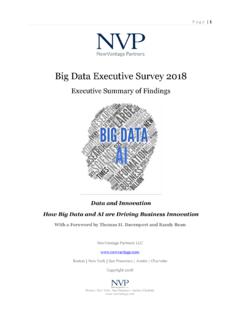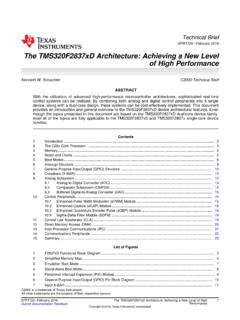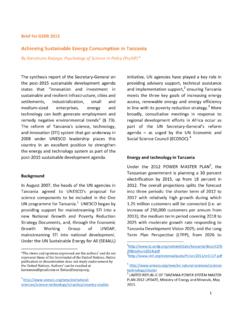Transcription of Big Data Executive Survey 2017 Executive Summary
1 Page | 1 Boston | New York | San Francisco | Austin | Charlotte Big Data Executive Survey 2017 Executive Summary of Findings Big Data Business Impact: achieving Business Results through Innovation and Disruption With a Foreword by Thomas H. Davenport and Randy Bean NewVantage Partners LLC Boston | New York | San Francisco | Austin | Charlotte Copyright 2017 Page | 2 Boston | New York | San Francisco | Austin | Charlotte Foreword The new year is often a time to celebrate, and indeed there is something to celebrate in the results of this Big Data Executive Survey for 2017. The Survey participants report that they have achieved considerable value from their Big Data initiatives. More than 80% of them say their Big Data investments have been successful, and almost half say their organizations can measure the benefits from their projects. Such optimism is by no means found for all business investments; one recent study by an analyst firm, for example, found that 6 out of 10 customers of one ERP vendor wouldn t buy from the same company again, and didn t feel they had achieved return on their investment.
2 Why are these executives so positive about Big Data? They report a variety of positive outcomes, including cost reduction, establishment of a data-driven culture, and various benefits related to innovation, new products and services, and industry disruption. Only of respondents deemed their Big Data initiatives failures, which is an impressively low number. The participants in this Survey are senior business and technology executives representing many of the world s largest and most sophisticated companies. Many come from financial services, which is one of the most aggressive sectors for business investment and technology adoption. Their sophistication and bellwether status suggests that we will soon see a growing number of firms across the private and public sectors as well as mid-size and smaller companies also deriving substantive value from Big Data work. If there is any sobering trend in these results, it lies in the apparent difficulty of organizational and cultural change around Big Data.
3 More than 85% of respondents report that their firms have started programs to create data-driven cultures, but only 37% report success thus far. Big Data technology is not the problem; management understanding, organizational alignment, and general organizational resistance are the culprits. If only people were as malleable as data. Perhaps related to this resistance, these organizations may be moving toward a future in which they get by with fewer people. 44% of respondents (a plurality) named cognitive technologies the disruptive technology they most expect to impact their firms over the next decade, and 89% felt these technologies would have some impact on their companies. 69% said their companies had already begun to use cognitive technologies. These tools are perhaps the logical result of increasing amounts of data; it is difficult to analyze it all with traditional human-centric methods. We expect that these technologies will have a major impact perhaps the greatest of any industry on financial services firms.
4 If the Survey respondents were celebrating the success of Big Data programs, they have no plans to rest on their laurels. Almost half 47% felt that their firms were at risk of major disruption in the next decade. We re not surprised in fact we wonder why the number isn t higher and we look forward to learning how Big Data, new technologies, and organizational change will drive these successful firms to overcome potential disruptions. Thomas H. Davenport and Randy Bean January 2017 Page | 3 Boston | New York | San Francisco | Austin | Charlotte Introduction In 2012, NewVantage Partners initiated the first Big Data Executive Survey targeting senior Fortune 1000 business and technology decision-makers. The Survey was conducted at the behest of a group of senior Fortune 1000 executives who sought to understand this new thing called Big Data and understand its emerging impact on the corporate mainstream. Would Big Data be a disruptive force or a passing gimmick?
5 Upon publication of the 2012 Survey , author Thomas H. Davenport called the Survey one of the few I have seen that focuses on large organizations and offers responses from C-level executives . And, so it has remained. This is our 5th Survey of senior corporate executives on the topic of Big Data. But, times change, and potentially disruptive forces must deliver on the promise of innovation and transformational results, or step aside for truly disruptive forces. Big Data is not going away however. The volume and sources of new data only continue to proliferate. Data is now more prevalent than ever. So the focus must shift to results, business value, and benefits. For these reasons, we have created a revamped and updated Survey for 2017 one which focused on the business impact of Big Data, asking these questions: Has your firm shown measurable results from Big Data investments? What is your overall assessment of the business results of your Big Data investments?
6 What are the impediments to Big Data success at your firm? What should be the primary role of the Chief Data Officer? What disruptive capabilities will impact your firm over the next decade? Do you fear that your firm may be at risk of major disruption in the coming decade? We are pleased to report that 50 Fortune 1000 or industry leading firms are represented in our 2017 Survey , and that C- Executive participation has never been higher. The following table summarizes Executive level participation in the 2017 Survey : Organizational Role Enterprise Data Leader | Chief Data Officer (CDO) Analytics Leader | Chief Analytics Officer Technology Leader | Chief Information Officer (CIO) Big Data Leader | Head of Big Data Business Leader | CEO | President Marketing Leader | Chief Marketing Officer (CMO) Other This Survey has over the past 5 years reflected the evolution of Executive perspectives as they have come to terms with Big Data. We have come to consider this an anecdotal Survey rather than a scientific Survey in that we have tried to capture the voice of Fortune 1000 executives facing a disruptive challenge.
7 We hope you find the results insightful. Page | 4 Boston | New York | San Francisco | Austin | Charlotte 2017 Survey Participating Firms Financial Services | Insurance AIG The Hartford Ally Financial IDB Bank American Express JPMorgan Chase American Fidelity Lincoln Financial Bank of America MetLife Bank of China MFS Investment Management Blackrock Moody's Capital One Morgan Stanley Capital Group Regions Bank Charles Schwab State Street Canadian Imperial Bank of Commerce SunTrust Bank Cigna TIAA Citi Travelers Citizens Bank UBS Eaton Vance USAA Fidelity Investments VISA Freddie Mac Wells Fargo Health | Life Sciences Media | Entertainment Additional Industries Astellas Pharma Bloomberg Estee Lauder Bayer AG Disney Ford Motors Biogen LinkedIn General Electric (GE) Geisinger Health Nielsen United Parcel Service (UPS) Quest Diagnostics Turner Broadcasting United Healthcare Legendary Industry Representation Financial Services Healthcare | Life Sciences Media | Entertainment Additional Industries Page | 5 Boston | New York | San Francisco | Austin | Charlotte Participant Summary C- Executive decision makers constitute the majority of Survey respondents.
8 Industries such as financial services have invested heavily in data initiatives and are a bellwether for Big Data investment, and results. Page | 6 Boston | New York | San Francisco | Austin | Charlotte Executive Summary Big Data is prevalent, but is it generating tangible, measurable business value? That is the question we set out to answer in our 5th Survey of leading corporate executives. Firms have been investing in Big Data initiatives, but have they been benefiting? In this report, we summarize the principal findings of the 2017 Big Data Executive Survey . Executives report measurable results from Big Data investments. Corporations are achieving measurable results and business benefits from their Big Data investments. That is the principal finding of the 2017 Executive Survey . A strong plurality of executives, , report that their firms have realized measurable benefits as a result of Big Data initiatives. A remarkable of executives characterize their Big Data investments as successful, with 21% of executives declaring Big Data to have been disruptive or transformational for their firm.
9 Cultural challenges remain an impediment to successful business adoption. In spite of the successes, executives still see lingering cultural impediments as a barrier to realizing the full value and full business adoption of Big Data in the corporate world. of executives report that organizational impediments prevent realization of broad business adoption of Big Data initiatives. Impediments include lack or organizational alignment, business and/or technology resistance, and lack of middle management adoption as the most common factors. 18% cite lack of a coherent data strategy. Firms are focusing on opportunities to innovate -- while reducing expense levels. Firms are striving to establish data-driven cultures ( ), create new avenues for innovation and disruption ( ), accelerate the speed with which new capabilities and services are deployed ( ), launch new product and service offerings ( ), monetize Big Data through increased revenues and new revenue sources ( ), and transform and reposition their business for the future ( ).
10 And, of course, are seeking to decrease expenses through operational cost efficiencies -- with reporting successful results from their cost reduction efforts as a result of Big Data investments. Chief Data Officer s will be expected to step up to lead the data innovation charge. A majority of firms report having appointed a Chief Data Officer ( ). While 56% see the role as largely defensive and reactive in scope today -- driven by regulatory and compliance requirements-- believe that the primary role of the Chief Data Officer should be to drive innovation and establish a data culture, and indicate that the role of the CDO should be to manage and leverage data as an enterprise business asset. Only suggest that regulatory compliance should be the focus of the CDO. Big firms are bracing for a decade of disruptive change. Executives fear that disruption is looming on the immediate horizon. A robust of executives express the view that their firm may be at risk of major disruption in the coming decade.








